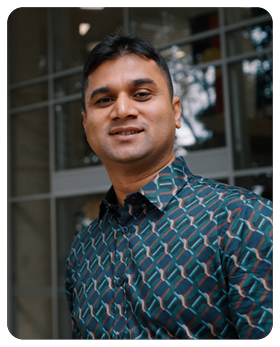In Queensland, 305 women are diagnosed with ovarian cancer every year. Sadly, the five-year survival rate for this disease is only 49%. Dr. Mostafa Kamal Masud is conducting cutting edge research that aims to turn these numbers around.
Understanding the Research
Dr Masud’s pioneering project, “A nanoarchitected platform for early diagnosis and monitoring of ovarian cancer” focuses on helping GPs better identify and diagnose ovarian cancer. Employing cutting-edge nanotechnology, he aims to develop rapid, inexpensive, and easy-to-use techniques for the early detection and monitoring of this challenging cancer.
What this research means for Queenslanders
The significance of Dr. Masud’s research lies in its potential to revolutionise the early detection of ovarian cancer in Queensland.
Dr. Masud aspires not only to advance scientific understanding but also to translate these discoveries into practical applications for early diagnosis and personalised treatment.
Currently, ovarian cancer is often diagnosed at an advanced stage, which significantly impacts how effective treatment can be. Dr. Masud’s work will help by providing an automated testing platform for early-stage ovarian cancer diagnosis.
The proposed device can detect ovarian cancer-specific biomarkers in less than 2 hours. This would be a game-changer for GP clinics across Australia. Early identification would help those diagnosed get referred quicker for more intensive surveillance or treatment. It is hoped this advancement will improve survival rates, and the overall quality of life for those who are diagnosed with ovarian cancer.
The researcher’s journey

Dr. Masud’s decision to become a cancer researcher is deeply rooted in personal experiences, including the untimely loss of his aunt and grandmother to ovarian and colon cancer respectively.
This led Dr Masud to embark on a professional and personal journey to explore new and easy ways to diagnose cancer. Inspired by the strength of individuals dealing with cancer and their stories of hope, Dr. Masud is committed to making meaningful contributions to cancer research and ensuring no Queenslander is left navigating cancer alone.
“As I progressed through my academic journey and gained exposure to the field, I found myself captivated by the intricate nature of cancer biology,” Dr Masud said.
“I’m also inspired by the strength of people dealing with cancer and their stories of hope. These experiences make me even more committed to cancer research. The prospect of making a meaningful impact on improving diagnosis, especially early diagnosis, proper treatment, and ultimately patient outcomes became a driving force for me.”
The rewarding aspects of his role
For Dr. Masud, the most rewarding aspect of his position is that he can improve cancer diagnosis and treatment and give Queenslanders a fighting chance at life. Whilst the pursuit of innovative ideas that enhance early diagnosis, treatment, and overall outcomes brings a deep sense of fulfillment.

Did you know there is still time to register to host a fundraiser this Daffodil Day in support of life-saving cancer research?
